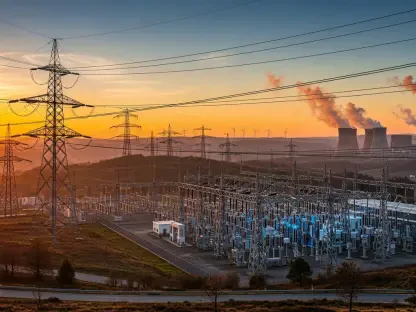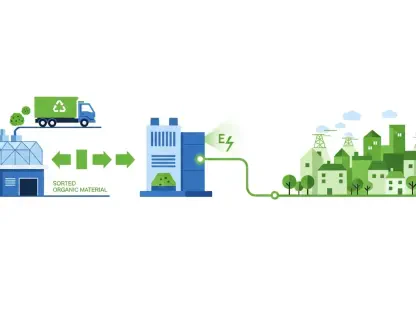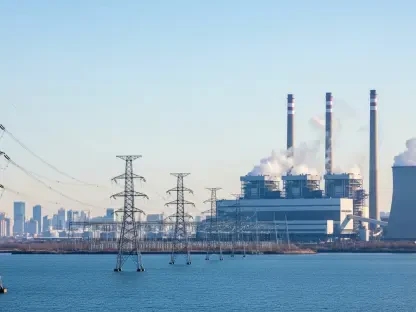The United Kingdom stands at a critical juncture in its battle against climate change, with a bold pledge to reach net zero greenhouse gas emissions by 2050, a commitment rooted in the Paris Agreement. Yet, as global temperatures inch perilously close to the 1.5-degree Celsius threshold above pre-industrial levels, doubts are mounting about the adequacy of the current approach. The ambitious target of cutting emissions by 81% by 2035 rests on a dramatic expansion of renewable energy and a doubling of energy efficiency efforts. However, many experts and critics argue that these plans are built on shaky foundations, relying heavily on untested technologies and timelines that may not align with the urgency of the crisis. This growing skepticism sets the stage for a deeper examination of whether the nation’s strategy can truly deliver on its promises or if it risks falling short when the stakes couldn’t be higher.
Evaluating Technological Approaches
High-Tech Solutions Under Scrutiny
The UK government has placed significant bets on advanced technologies like Carbon Capture and Storage (CCS) and nuclear power to drive its net zero ambitions, allocating billions to these initiatives. CCS, in particular, is often heralded as a way to trap emissions from industrial processes, but its scalability remains unproven, and the risk of stored carbon leaking back into the atmosphere raises serious concerns. Additionally, the energy required to operate CCS systems could offset much of the intended environmental benefit, casting doubt on its role as a viable solution. Critics argue that such high-stakes investments divert attention and resources from more immediate, reliable measures that could cut emissions now rather than banking on future breakthroughs.
Nuclear power, another cornerstone of the strategy, faces its own set of challenges that undermine its effectiveness in addressing the climate crisis. While it promises low-carbon energy, the technology is plagued by long delays in project delivery and unresolved issues surrounding radioactive waste disposal. These hurdles mean that nuclear facilities may not come online in time to make a meaningful impact within the critical window for emissions reductions. Furthermore, the immense financial costs tied to nuclear development could strain budgets that might be better allocated to proven, quicker-to-implement alternatives. This reliance on speculative solutions highlights a broader concern about prioritizing innovation over practicality in the face of urgent climate needs.
Renewables: Not a Complete Answer
Renewable energy sources, such as wind and solar, are often positioned as the backbone of a decarbonized future, yet their limitations in the UK context are becoming increasingly apparent. The production of wind turbines and solar panels involves energy-intensive processes, often reliant on fossil fuels for materials like steel, concrete, and silicon. This hidden carbon footprint undermines the notion that renewables are a fully clean solution, especially when considering the entire lifecycle of these technologies. In a climate like the UK’s, where sunlight and wind strength can be inconsistent, the energy return on investment remains disappointingly low, further complicating the transition away from traditional energy sources.
Beyond production challenges, the integration of renewables into the national grid poses additional hurdles that temper optimism about their potential. Intermittency issues—where power generation fluctuates with weather conditions—require robust backup systems or storage solutions, which are not yet fully developed or cost-effective at scale. While plans to increase solar and wind capacity to significant percentages by 2030 are underway, the indirect emissions from manufacturing and the inefficiencies in energy output suggest that renewables alone cannot shoulder the burden of decarbonization. This reality underscores the need for a more holistic approach that addresses these systemic gaps rather than relying on a single type of technology to solve all problems.
Societal and Global Dimensions
Shifting Mindsets and Policies
Achieving net zero emissions extends far beyond technological fixes; it demands a profound shift in societal attitudes and behaviors, a challenge that current policies struggle to address effectively. The concept of “frugal abundance”—living with less while prioritizing shared resources and community well-being—stands in stark contrast to a culture long defined by consumption and individual gain. Convincing the public to embrace reduced travel, fewer material goods, and a focus on local economies requires not just policy incentives but a reimagining of what constitutes a fulfilling life. Without addressing these cultural underpinnings, even the most ambitious climate targets risk being met with resistance or apathy from a population unaccustomed to such sacrifices.
Politically, the landscape surrounding net zero is fraught with division, complicating efforts to build consensus on the path forward. On one side, skeptics question the impact of fossil fuels and resist renewable energy due to concerns over reliability, while on the other, advocates sometimes oversimplify the transition as a straightforward switch to green technologies. Bridging this divide necessitates a narrative that emphasizes fairness, equity, and collective benefit, ensuring that the burdens of change are not disproportionately borne by vulnerable communities. Crafting policies that resonate with diverse viewpoints while maintaining scientific integrity remains a delicate balancing act, one that could determine the success or failure of long-term climate goals.
Global Responsibility and Equity
Given its historical role as one of the world’s largest emitters, the UK carries a substantial moral obligation to lead on climate action, yet its current approach often falls short of this responsibility. Studies indicate that the nation’s carbon budget, as advised by official bodies, is disproportionately high compared to a fair global share, especially when factoring in past contributions to cumulative emissions. This inequity raises critical questions about whether the UK is genuinely committed to global justice or if it prioritizes domestic interests over international obligations. Addressing this disparity is not just a matter of numbers but a test of ethical leadership on the world stage.
Compounding this issue is the redirection of resources away from global climate initiatives toward other national priorities, such as military spending. Cuts to overseas aid for climate projects in favor of defense budgets signal a troubling lack of commitment to supporting vulnerable nations most affected by climate change—nations that often contribute the least to global emissions. With over a quarter of worldwide emissions stemming from countries with minimal individual shares, the UK’s influence as a historical emitter could set a powerful precedent for collective action. Choosing equity over self-interest by reinstating and expanding climate aid could amplify global efforts, demonstrating that leadership means taking responsibility for past actions as much as planning for future outcomes.
A Call for Radical Change
The path to net zero demands far more than incremental adjustments; it requires a fundamental overhaul of how energy is consumed and valued within society, a perspective gaining traction among critics of the current framework. Low-tech, sustainable practices—such as passive solar heating for buildings and regenerative agriculture—offer practical alternatives that reduce reliance on electricity-dependent solutions while minimizing environmental impact. These approaches, though less glamorous than high-tech innovations, prioritize resilience and local empowerment, cutting emissions in ways that directly benefit communities. Embracing such methods could redefine progress, moving away from endless growth toward a model of balance and sufficiency.
Equally important is the cultural transformation needed to support these systemic changes, a shift that challenges deeply ingrained notions of prosperity tied to excess. Encouraging a mindset of “private sufficiency and public luxury”—where personal consumption is minimized but shared resources are abundant—could pave the way for sustainable living without sacrificing quality of life. This vision, while daunting in its scope, addresses the root causes of the climate crisis rather than merely treating symptoms with temporary fixes. Reflecting on the debates and critiques of the past, it becomes clear that without such bold pivots, the UK risks missing its climate targets. Looking ahead, policymakers and society alike must commit to these radical yet necessary steps, ensuring that equity, sustainability, and community remain at the heart of every decision.









